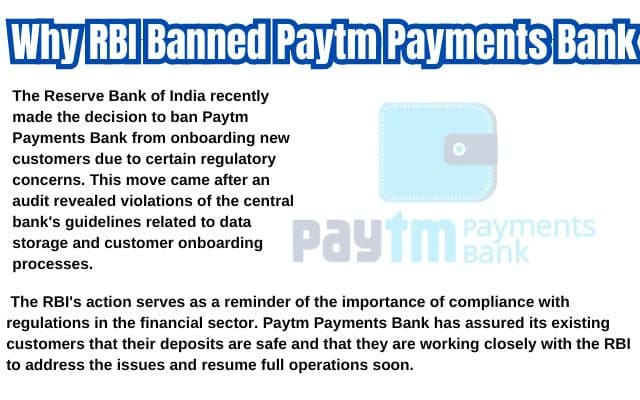Why RBI Banned Paytm Payments Bank: A Comprehensive Analysis

In the dynamic world of digital banking, the recent decision by the Reserve Bank of India (RBI) to ban Paytm Payments Bank has sent ripples across the industry. This unprecedented move has sparked a flurry of discussions and debates among stakeholders, customers, and industry experts alike.
The RBI, India’s central banking institution responsible for the issue and supply of the Indian Rupee and the regulation of the money market, has a pivotal role in maintaining the economic stability of the country. Its decision to ban Paytm Payments Bank, therefore, is not one that has been taken lightly.
Paytm Payments Bank, a prominent player in India’s digital economy, has been at the forefront of the financial technology revolution in the country. The ban imposed by the RBI has not only impacted the bank but also its vast user base who relied on its services for their daily financial needs.
In this article, we delve into the reasons behind the RBI’s decision, its implications, and the future of digital banking in India. As we navigate through this complex issue, we aim to provide a comprehensive analysis that sheds light on the various facets of this significant event in India’s banking history.
Stay tuned as we unravel the story behind why the RBI banned Paytm Payments Bank.
Background of Paytm Payments Bank
Paytm Payments Bank, a subsidiary of One97 Communications, has been a significant player in India’s fintech revolution. With over 330 million digital wallet accounts, it has been instrumental in driving the shift towards digital payments in a country where cash transactions have traditionally dominated.
The bank’s services extend beyond just digital wallets. It offers a range of financial services, including savings and current accounts, FASTags, National Common Mobility Cards, and more. These services have made financial transactions more accessible and convenient for millions of Indians, particularly in the wake of the government’s push for digitalization.
However, on February 29, 2024, the Reserve Bank of India (RBI) imposed a ban on Paytm Payments Bank. The ban restricts the bank from accepting new deposits and onboarding new customers. It also bars the bank from offering basic payment services, including Unified Payments Interface, IMPS, Aadhaar-enabled payments, and bill payment transactions.
The RBI’s decision was based on persistent non-compliances and continued material supervisory concerns in the bank. Despite repeated warnings and ample time given to rectify its non-compliance issues, the bank failed to comply with regulations.
This development has raised concerns about disruptions to digital payments, given Paytm’s widespread use in India. However, the Paytm app remains fully operational, and the company is accelerating partnerships with banks to offer uninterrupted services.
The Role of RBI in Regulating Banks
The Reserve Bank of India (RBI) plays a crucial role in maintaining the stability and integrity of the financial system in India. As the country’s central banking institution, it is tasked with the regulation and supervision of the nation’s monetary policy and the financial sector.
One of the key responsibilities of the RBI is to regulate and supervise commercial banks, non-banking finance companies (NBFCs), and urban cooperative banks (UCBs). This involves ensuring these institutions adhere to the necessary compliance and audit requirements. To facilitate this, the RBI has combined the supervisory functions for these entities into a unified department.
In addition to this, the RBI also imposes monetary penalties on banks that fail to comply with its regulations. For instance, it has stipulated a minimum net worth requirement for Tier 1 UCBs operating in a single district and for all other UCBs.
In recent years, the RBI has taken steps to strengthen its regulatory framework. This includes facilitating the setting up of a self-regulatory body – the Secondary Loan Market Association (SLMA) – to ensure adherence to compliance and audit requirements.
In the case of Paytm Payments Bank, the RBI’s decision to impose a ban was based on the bank’s persistent non-compliance with these regulations. Despite being given ample time to rectify its non-compliance issues, Paytm Payments Bank failed to do so, leading to the RBI’s decision.
The Ban: An Overview
On February 29, 2024, the Reserve Bank of India (RBI) imposed a ban on Paytm Payments Bank. This decision was not taken lightly and has had significant implications for the bank and its customers.
The ban restricts Paytm Payments Bank from accepting new deposits and onboarding new customers. It also bars the bank from offering basic payment services, including Unified Payments Interface (UPI), Immediate Payment Service (IMPS), Aadhaar-enabled payments, and bill payment transactions.
The RBI’s decision was based on persistent non-compliances and continued material supervisory concerns in the bank. Despite repeated warnings and ample time given to rectify its non-compliance issues, the bank failed to comply with regulations.
The immediate effects of the ban were felt by the bank and its vast user base. Paytm Payments Bank, with over 330 million digital wallet accounts, is widely used in India for various financial transactions. The central bank’s directive barring new deposits into Paytm Payments Bank has raised concerns about disruptions to digital payments.
However, the Paytm app remains fully operational, and the company is accelerating partnerships with banks to offer uninterrupted services. In response to queries about customer inconvenience, RBI Deputy Governor Swaminathan J stated that suitable measures would be taken to minimise any disruptions.
Reasons Behind the Ban
The Reserve Bank of India’s (RBI) decision to ban Paytm Payments Bank was not taken lightly. It was the culmination of a series of events marked by persistent non-compliance and continued material supervisory concerns.
The RBI, in its role as the regulator of the banking sector in India, has the responsibility to ensure that all banks comply with the necessary regulations. These regulations are designed to maintain the stability and integrity of the financial system.
In the case of Paytm Payments Bank, the RBI had identified several areas of non-compliance. Despite repeated warnings and ample time given to rectify these issues, the bank failed to comply. The RBI’s decision to impose a ban was based on the bank’s failure to adhere to these regulations.
One of the key issues highlighted by the RBI was related to the creation of hundreds of thousands of accounts at Paytm Payments Bank without proper identification. This raised serious concerns about the bank’s adherence to Know Your Customer (KYC) norms, which are crucial for preventing fraud and money laundering.
Additionally, the RBI’s comprehensive system audit report and subsequent compliance validation report of the external auditors revealed persistent non-compliances and continued material supervisory concerns in the bank. These findings warranted further supervisory action, leading to the ban.
The RBI’s decision to restrict Paytm Payments Bank from accepting new deposits was made after giving the company ample time to rectify its non-compliance issues. However, despite these opportunities, the bank failed to address the concerns raised by the RBI.
The ban imposed by the RBI is a clear indication of the central bank’s commitment to maintaining the integrity of the banking system in India. It sends a strong message to all banks about the importance of compliance and the consequences of non-compliance.
Impact on the Indian Financial Ecosystem
The ban imposed on Paytm Payments Bank by the Reserve Bank of India (RBI) has significant implications for the Indian financial ecosystem. As a major player in the digital payments sector, Paytm’s operations affect a large number of users and businesses across the country.
The immediate impact of the ban was felt by Paytm’s vast user base. With over 330 million digital wallet accounts, Paytm is widely used in India for various financial transactions. The RBI’s directive barring new deposits into Paytm Payments Bank raised concerns about disruptions to digital payments.
However, the Paytm app remains fully operational, and the company is accelerating partnerships with banks to offer uninterrupted services. In response to queries about customer inconvenience, RBI Deputy Governor Swaminathan J stated that suitable measures would be taken to minimise any disruptions.
The ban also sends a strong message to other players in the financial sector about the importance of regulatory compliance. It underscores the RBI’s commitment to maintaining the integrity of the banking system in India.
In the longer term, the ban could lead to increased scrutiny of digital payment providers and fintech companies. This could result in stricter regulations and higher compliance costs for these companies.
The RBI’s decision also highlights the challenges faced by digital payment providers in navigating the complex regulatory landscape. It underscores the need for these companies to invest in robust compliance mechanisms to ensure they meet all regulatory requirements.
FAQs on Paytm and RBI’s Actions
Why is RBI banning Paytm?
The Reserve Bank of India (RBI) has taken action against Paytm Payments Bank due to persistent non-compliance issues and supervisory concerns. The bank failed to comply with regulations despite repeated warnings.
What is the issue with Paytm bank?
The RBI highlighted concerns over supervisory matters and violations of regulatory rules by Paytm Payments Bank. There were also concerns about the creation of hundreds of thousands of accounts without proper identification.
Is Paytm Payments Bank shutting down?
Paytm Payments Bank is not shutting down entirely. However, after February 29, 2024, it will no longer be able to collect deposits, conduct credit transactions, or top up any customer accounts.
What are the reasons for Paytm regulatory?
The regulatory actions against Paytm stem from the bank’s failure to comply with regulations despite repeated warnings. The RBI highlighted concerns over supervisory matters and violations of regulatory rules.
What is Paytm’s issue with RBI?
Paytm Payments Bank has been facing issues with the RBI due to persistent non-compliance and supervisory concerns. The bank failed to comply with regulations despite repeated warnings.
What exactly happened with Paytm?
The RBI ordered Paytm Payments Bank to stop accepting new deposits and conducting credit transactions after February 29, 2024, due to persistent non-compliance and supervisory concerns.
What is the reason behind Paytm’s downfall?
Paytm’s stock price has been falling due to a variety of factors, including the RBI’s actions, receding interest among investors for loss-making growth companies, and confusion about Paytm’s road to profitability.
Is Paytm Payments Bank banned by RBI?
The RBI has not banned Paytm Payments Bank but has imposed restrictions on it. The bank has been barred from accepting new deposits and conducting credit transactions after February 29, 2024.
Why did Paytm crash today?
Paytm’s shares crashed due to the RBI’s actions and the company’s announcement to slow down its small-ticket postpaid loans while looking to expand its high-ticket personal loans and merchant loans.
- How to earn money using Paytm?
- Paytm First Game: Why Should You Choose Paytm First Games App?
- How to Add Money in Paytm Wallet without Debit Card
- How to Deactivate Paytm Postpaid
Conclusion: The Future of Digital Banking in India
The ban on Paytm Payments Bank by the Reserve Bank of India (RBI) marks a significant event in the history of India’s digital banking sector. It underscores the importance of regulatory compliance and the potential consequences of non-compliance.
While the immediate impact of the ban was felt by Paytm’s vast user base, the company has taken steps to ensure uninterrupted services. The RBI, too, has assured that suitable measures would be taken to minimise any disruptions.
The ban also sends a strong message to other players in the financial sector about the importance of regulatory compliance. It underscores the RBI’s commitment to maintaining the integrity of the banking system in India.
In the longer term, the ban could lead to increased scrutiny of digital payment providers and fintech companies. This could result in stricter regulations and higher compliance costs for these companies.
The RBI’s decision also highlights the challenges faced by digital payment providers in navigating the complex regulatory landscape. It underscores the need for these companies to invest in robust compliance mechanisms to ensure they meet all regulatory requirements.





